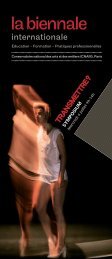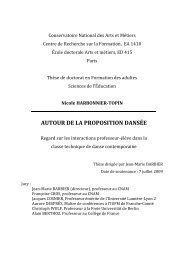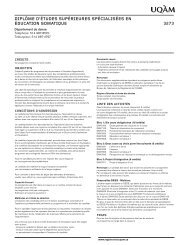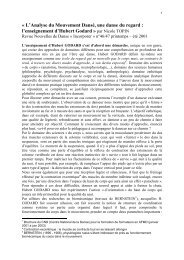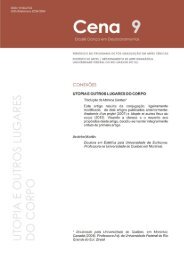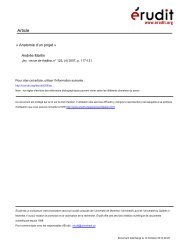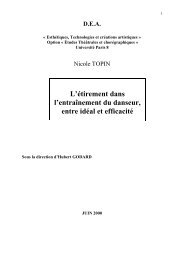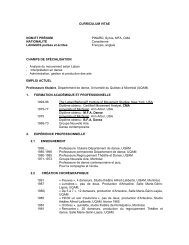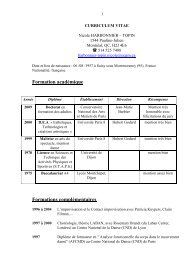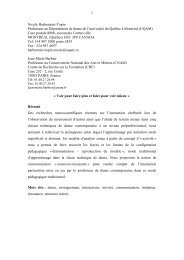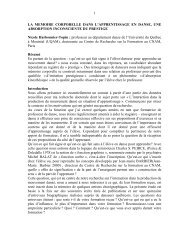Day 2 - Département de danse - UQAM
Day 2 - Département de danse - UQAM
Day 2 - Département de danse - UQAM
You also want an ePaper? Increase the reach of your titles
YUMPU automatically turns print PDFs into web optimized ePapers that Google loves.
12:30pm-2:00pm<br />
Lunch & Launch<br />
University Club<br />
Lunch courtesy of Playwrights Canada Press, featuring readings from Yvette Nolan (The Unplugging), Joseph Jomo Pierre<br />
(Shakespeare’s Nigga), Jim Dugan (Discovering Mavor Moore), Natalie Alvarez (Latina/o Canadian Theatre Performance),<br />
and Lina <strong>de</strong> Guevara (Fronteras Vivientes)<br />
2:15-3:45pm<br />
a) University Stu<strong>de</strong>nt Productions George<br />
Roundtable Organizers: Moira <strong>Day</strong> (University of Saskatchewan) and Diana Manole (Trent University).<br />
Participants: Conrad Alexandrowicz (University of Victoria), Irwin Appel (University of California Santa<br />
Barbara), Claire Borody (U Winnipeg), Claire Carolan (Simon Fraser University), Andrew Houston<br />
(University of Waterloo, Ursula Neuerburg-Denzer (Concordia University), Jenny Salisbury (University<br />
of Toronto), Paul Stoesser (University of Toronto)<br />
This roundtable panel addresses the issue of university stu<strong>de</strong>nt productions’ artistic value vs. their educational value.<br />
Consistent with this year’s conference theme, drama/theatre/ performance “at the edge” of innovative scholarship and practice<br />
in Canada and beyond, we invite participants to consi<strong>de</strong>r both our current practice and possible new directions in response to<br />
Patrice Pavis’s plea to “revamp” the year-end and other types of university stu<strong>de</strong>nt productions into “artistic research<br />
project(s)” (429) that are properly valued by the theatre and aca<strong>de</strong>mic communities as both teaching tools with educational<br />
value, and as artistic creations in their own right.<br />
b) Performance and Auto/ethnography: Interdisciplinary Conversations Bishop<br />
Curated Panel Mo<strong>de</strong>rator: Magdalena Kazubowski-Houston (York University) and Dara Culhane<br />
(Simon Fraser University)<br />
“Do You Hear Me Looking at You? Autoethnography, Collaborative Memory Work, and Irish<br />
Performance Studies.” Dara Culhane (Simon Fraser University)<br />
This presentation analyzes a performance event held in Co. Galway, Eire, in November 2012. The event consisted in my<br />
autoethnographic performance drawn from memories, archival research into family letters and photographs, interviews with<br />
siblings and relatives, and a personal collection of letters that trace my relationship with my father through my journey from<br />
adolescence to middle age, and his from middle age to old age, <strong>de</strong>mentia, and <strong>de</strong>ath. The performance reflects on research<br />
creation, imagination and memory, relationships between children and parents across time and space, and wrestles with the<br />
question: can we achieve reconciliation without forgiveness?<br />
Audience participants were invited to carry on conversations evoked by the performance over a post performance meal.<br />
The intergenerational, transnational audience engaged in collaborative memory work/storytelling that inclu<strong>de</strong>d <strong>de</strong>bates about<br />
historical and contemporary changes in Irish society, education and family life; political/aesthetic <strong>de</strong>bates about storytelling<br />
and theatrical performance practices; tensions between “fiction” and “nonfiction” in autobiography; experiences of emigration<br />
and exile; relationships between children and parents in Diaspora, and the contentious question of forgiveness in the context<br />
of post war peace-building.<br />
I bring emerging scholarship on the potential contributions of Deleuzian theory to autoethnographic performance<br />
scholarship into conversation with Irish Performance Studies that articulates traditions of storytelling, autoethnography, and<br />
monologue performance with analyses of the “inherently theatrical” in Irish social life. I offer this presentation as a story “good<br />
to think with” about contemporary <strong>de</strong>bates in autoethnographic performance, and potential connections with collaborative<br />
memory work extending beyond the performance event.<br />
“‘Quiet Theatre:’ Towards a New Autoethnographic Praxis.” Magdalena Kazubowski-Houston<br />
(York University)<br />
This paper rethinks autoethnography in the context of performance ethnography research by focusing on my ongoing work<br />
with Roma women in postsocialist Poland. I trace the trajectory of my autoethnographic research from critical reflexivity to<br />
what I refer to as “quiet theatre." I discuss the ways in which ethical and moral dilemmas that had marked my doctoral<br />
fieldwork led me to reconceptualise critical autoethnography, not merely as a project of <strong>de</strong>stabilizing power differentials<br />
between the ethnographer and research participants, but also as a critique of power struggles within the ethnographic<br />
research process itself. Furthermore, I consi<strong>de</strong>r how my recent project, which studies el<strong>de</strong>rly Polish Roma women’s<br />
experiences of ageing through dramatic storytelling, has further impelled me to formulate the concept and praxis of “quiet<br />
theatre:” an autoethnographic inquiry wherein research participants take on key roles in <strong>de</strong>fining the nature, scope and<br />
applications of reflexivity, both during fieldwork and in the ensuing ethnographic products. In doing so, I suggest ways of<br />
facilitating an autoethnographic, bidirectional research process in which the ethnographer and research participants can seek<br />
reciprocal empathic and cognitive un<strong>de</strong>rstandings of one another’s worlds.<br />
23



